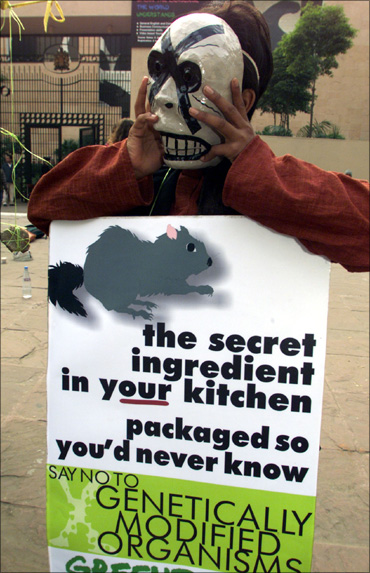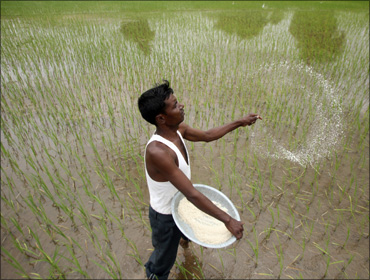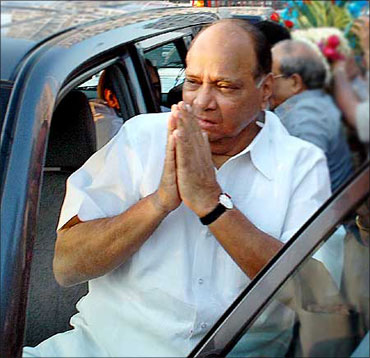 | « Back to article | Print this article |
Can only GM crops ensure India's food security?
While corruption scandals continue to grab headlines the drawing of battle lines in a bitter war over our food future is getting relatively less attention.
On December 3, Union Minister for Agriculture, Sharad Pawar told a CII meeting in Chandigarh that India's food security depends on genetically modified food.
He brushed aside opposition to GM crops as the work of those who are always opposed to new technologies.
A week later, on a bright and chilly morning in Delhi, hundreds of farmers from different corners of India came to Mahatma Gandhi's samadhi to renew their pledge to fight for non-toxic food, sustainable livelihoods for farmers and India's food sovereignty.
That solemn gathering at Raj Ghat marked the culmination of the Kisan Swaraj Yatra, which began three months earlier at Sabarmati Ashram in Ahmedabad.
Click NEXT to read on . . .
Can only GM crops ensure India's food security?
Traversing 20 states of India the Yatra had a three point agenda: Food, Farmers, Freedom.
On December 11, while the bulk of yatris were at Raj Ghat, their representatives went to meet Congress president Sonia Gandhi.
The list of demands they submitted provides a bird's eye view to the war that is now taking shape. Proponents of Kisan Swaraj want both the government and private sector to, among other things:
1. Stop treating agricultural resources -- like seeds, land and water -- as commodities for the benefit of business corporations and instead ensure that they are used to serve the livelihood needs of people at large.
2. Prevent forcible acquisition and diversion of agricultural lands, either rain-fed or irrigated, to non-agricultural and non-food uses.
Click NEXT to read on . . .
Can only GM crops ensure India's food security?
3. Promote and provide incentives to low-cost, ecologically sustainable agricultural technologies and practices, which ensure livelihoods for small farmers.
4. Ensure fair and remunerative prices for all crops by recasting the Minimum Support Price regime -- including timely procurement and a price stabilisation fund.
5. Build a thriving rural economy by developing extensive facilities for farmer-led agricultural processing, storage and marketing.
Since these are rather basic, no-brainer kind of points, Sonia Gandhi gave the Kisan Swaraj team a sympathetic hearing. She also invited them to make a formal presentation to the National Advisory Council. But this might prove to be a very small step forward in the months to come.
There are other demands emerging from the Kisan Swaraj campaign which face bitter opposition from both political forces within the ruling coalition and private corporations.
Click NEXT to read on . . .
Can only GM crops ensure India's food security?
For instance, the Kisan Swaraj opposition to any Intellectual Property Rights (IPRs) on either seeds or the traditional knowledge belonging to farming communities runs counter to the power of global patent regimes and related dispensation of the World Trade Organization.
Similarly, the Kisan Swaraj campaign demands that both Central and State governments cancel all agreements with Monsanto, Syngenta and other agricultural multinational corporations. It also opposes any extension of the Indo-US Knowledge Initiative in Agriculture.
As statements by Pawar and leaders of the private sector indicate, such demands will be dismissed as being 'unthinkable'. Those who take this view might also take comfort from the fact that the Kisan Swaraj gathering filled a small lawn near Raj Ghat and not Ramlila Ground or Boat Club which have in the past hosted rallies which attracted lakhs of farmers.
But it might be fatal to relinquish our food future to a visible display of crowd-strength. Proponents of the Yatra claim that as they connected with lakhs of farmers and other citizens in its journey across India they found wide spread support for these demands.
Of course, many people are also expressing their confusion over issues like GM crops and the whole tussle between organic food and agriculture based on industrial pesticides and fertilizers.
Click NEXT to read on . . .
Can only GM crops ensure India's food security?
A mobilisation like the Yatra is significant because it attempts to address this confusion by calling for a review of our food future by all stakeholders -- farmers, agro-industrial companies, scientists, other professionals and ordinary citizens.
It does so in the hope that then it might be possible to challenge and alter the current agenda of the NARS (National Agricultural Research Systems) which is biased in favour of corporate-driven, high-input intensive technologies.
Where ever the Yatra went it found farmers deeply worried about the ecological crisis which is a consequence of the Green Revolution model. "Thirty years is a very short time for such massive depletion of soil and water" says Kiran Vissa, a member of the Yatra organising team.
It is clear to most people that the situation cannot be rectified with some small changes. "What we need are drastic changes carried out with urgency."
Instead, adds Vissa, a recent report by the agriculture working group consisting of the chief ministers of Haryana, Punjab, Bihar and West Bengal has recommended aggressive application of hybrids and biotechnology as the way for a second green revolution in rain-fed areas.
Click NEXT to read on . . .
Can only GM crops ensure India's food security?
What is even more worrisome, says G V Ramanjaneyulu, executive director of the Hyderabad-based Centre for Sustainable Agriculture, is the big push to grow just four plants -- hybrid rice, soyabean, hybrid maize and hybrid cotton.
"Except for these four all other crop area is diminishing. In soya, maize and cotton Monsanto has a virtual monopoly and in hybrid rice its subsidiary Mahyco is almost a monopoly," adds Ramanjaneyulu.
This increase in cash crop cultivation, and corresponding decline in cultivation of a vast variety of pulses, millets and grains, has dire implications for the nutritional level of the entire population and particularly the poor.
In this context the Kisan Swaraj Yatra stands out as a successful mobilisation to focus public attention on critical issues.
It is a significant and necessary but an insufficient measure. That will depend on a wide variety of scientists, policy makers, professionals, political activists and ordinary citizens taking a closer interest in securing our food future.
Rajni Bakshi is the author of the book Bazaars, Conversations and Freedom: For a Market Culture Beyond Greed and Fear, which last week won the Vodafone Crossword jury award in Non-fiction category and the Vodafone-Crossword Popular book award.





